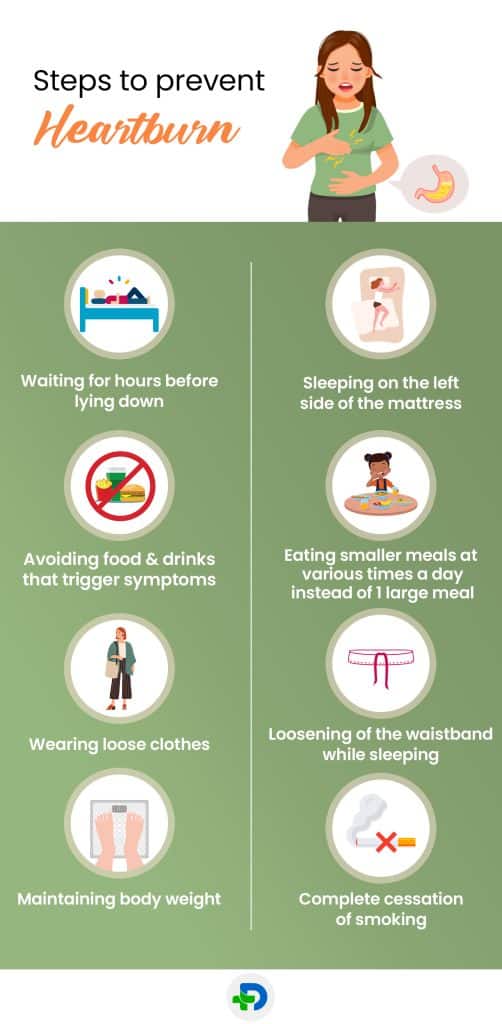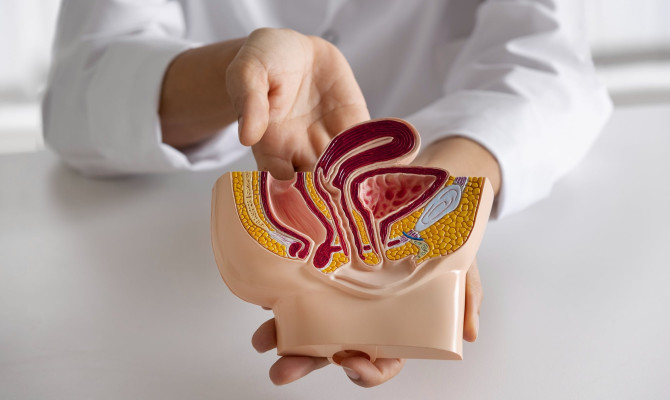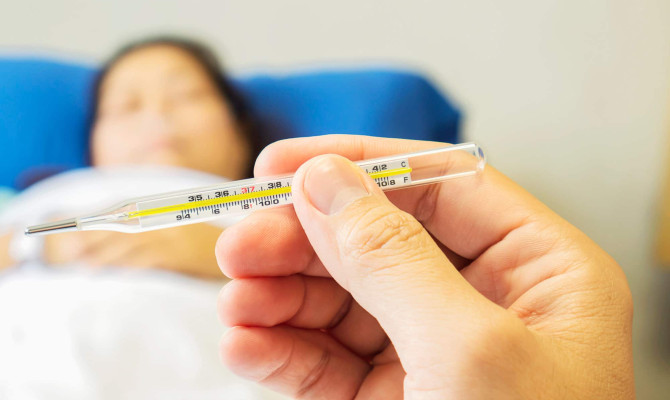Heartburn: Causes, Symptoms, and Management

- Heartburn
- 22 Aug 2023
Overview
What is heartburn?
Heartburn is an uncomfortable burning sensation in the esophagus (food pipe) and the middle chest area just behind our breastbone. It is due to stomach acid coming back from the stomach to the food pipe. It is common in many individuals and not generally a cause of concern, and is treatable. But persistent heartburn can be a symptom of Gastroesophageal reflux disease (GERD).
GERD is a disease in which stomach content leaks back from the stomach to the food pipe.

Facts of heartburn
- Heartburn is also known as cardialgia, acid indigestion, or pyrosis
- Heartburn is quite common among the pregnant woman
- Heartburn could become a cause of concern if left untreated
- Around 15 million people in the United States experience heartburn every day 1Overview| Researched based study from Biomedcentral.com ,2Overview| Researched based study from Sciencedirect.com .
Causes
Causes of heartburn
- When the lower esophageal sphincter is weak or does not close properly, the stomach acid from the stomach returns to the esophagus. It causes pain and a burning sensation in the chest area.
- An esophageal sphincter is a muscular valve that prevents stomach acid from returning to the food pipe 3Causes| Researched based study from Nlm.nih.gov .
Causes for weakening or improper closing of the lower esophageal sphincter
- Pregnancy
- Obesity (increased body weight)
- Constipation(difficulty in passing stool)
- Smoking
- Indigestion
- Bloating (stomach gas)
- A heavy meal that makes the stomach gets stretched
- Wearing tight-fitting clothing
- Lying down immediately after a meal
- Hiatal hernia (a disease in which the upper stomach bulges out through the diaphragm into the chest cavity) 3Causes| Researched based study from Nlm.nih.gov
Triggers
What food causes heartburn?
Food that triggers heartburn
- Chocolate
- Carbonated drinks
- Coffee
- Peppermint
- Tomatoes
- Garlic
- Onion
- Citrus fruits
- Spicy food
- Fried foods
- High-fat food
- Alcohol 4Triggers| Researched based study from Nlm.nih.gov
Symptoms
Symptoms of heartburn
Some common symptoms of heartburn are:
- A feeling of pain in the chest or throat
- A burning pain like that of indigestion
- An ache or pressure behind the breastbone
- Pain worsens while bending or lying down
- A sour taste in the mouth
- A feeling that food is trapped in the chest or throat
- Nausea (a feeling of uneasiness in the stomach)
- Vomiting
- Burping (expelling gas through the mouth)
- Coughing
Other uncommon symptoms:
- Hiccups
- Persistent cough
- Stomach gas
- Sore throat
- Difficulty in swallowing
- Pain and swelling of the voice box(laryngitis)5Symptoms| Researched based study from Nlm.nih.gov
Diagnosis
Diagnosis of heartburn
Esophageal pH monitoring
- It measures the amount of acid that flows back to the esophagus from the stomach.
- It is used to diagnose Gastroesophageal reflux disease(GERD)
Ambulatory acid (pH) probe test
- The test measures the duration and the amount of stomach acid entering the esophagus.
- A thin tube is put into the esophagus through the nose, the sensor at the end of the tube measures the stomach acid amount in the esophagus.
Upper Endoscopy
- The doctor inserts a tube with a camera through the throat into the stomach to examine the upper part of the digestive tract.
- It checks for ulcers in the esophagus or the stomach lining
Esophageal manometry
- The doctor puts a thin tube through the nose into the stomach to measure the esophagus contraction.
- The test looks for the proper functioning of the esophagus and esophageal sphincter.
Electrocardiogram (ECG)
- It checks for proper heart functioning and analyses the heart rate
- ECG is performed to confirm if the heart is the cause of the symptom
X-ray
- It uses electromagnetic waves to analyze the interior of the body, viz; esophagus, stomach, and intestine 6Diagnosis| Researched based study from Nlm.nih.gov
Vulnerability
People at risk of heartburn
- Aged person (as with age, muscles weaken, so the opening and closing of the muscular oesophageal valve gets affected)
- Pregnant woman
- Regular smokers
- Obese people
- Hiatal hernia patients(abdominal organs slip through the diaphragm)
- Hypertension patients on high blood pressure medication
- Patients with sleep disorders and are on sedatives 7Vulnerability| Researched based study from Nlm.nih.gov
Complications
Complications associated with heartburn
Recurrent injury to the esophagus lining can lead to the following complications
Intestinal metaplasia
- It is a precancerous condition in which the stomach lining cells are altered or renewed. The transformed cells are similar to the intestinal lining cells.
- The condition is Barrett’s esophagus, when tissues similar to the intestine replace the esophageal tissue.
Esophageal strictures
- The tissues of the esophagus are swelled constantly, and the tissue might get replaced with scar tissue.
- It leads to abnormal narrowing of the esophagus that ultimately causes swallowing difficulty.
Esophageal cancer
- The cells in the esophagus lining grow uncontrollably, forming tumors
- The risk is higher for individuals with untreated severe heartburn.
Some other complications include
- Gastritis (inflammation of the stomach lining)
- Stomach ulcers ( a painful sore in the stomach lining) 8Complications| Researched based study from Nlm.nih.gov
Treatment
Treatment of heartburn
Over-the-counter medication
Antacids
It nullifies the stomach acid and provides quick relief. Some common antacids are
- Gaviscon
- Mylanta
- Rolaids
- Mylanta
Proton pump inhibitors
It decreases the stomach acid and heals the damaged esophagus tissue. Some common proton pump inhibitors are-
- Omeprazole magnesium
- Omeprazole and sodium bicarbonate
- Lansoprazole
- Esomeprazole
Histamine-2(H2) blockers
It decreases the stomach acid secretion and treats duodenal ulcers(ulcers in the first part of the small intestine) Some common Histamine-2(H2) blockers are
- Nizatidine
- Cimetidine
- Famotidine
Alginates
- It is an edible sugar obtained from brown seaweeds
- It prevents acid reflux by acting as a barrier between the stomach and esophagus 9Treatment| Researched based study from Fda.gov
Alternative treatment for heartburn
Lifestyle modification
- Regular exercise and walking after meals help correctly digest food without acid reflux.
- Maintaining a healthy balanced diet and also eating on time prevents heartburn incidence.
Sitting correctly after eating
- Sitting upright can prevent heartburn
- An upright position puts less pressure on the abdomen and reduces the risk of acid reflux 10Treatment| Researched based study from Nlm.nih.gov
Elevating the upper body in bed
- Using extra pillows to raise the upper body can reduce heartburn
- Using an adjustable bed to raise the upper body from the waist helps better in reducing the symptoms of heartburn
Remedies
Home remedies for heartburn
Ginger
- Ginger (in small amount) in boiling water help relieve the symptoms of heartburn, such as nausea and vomiting.
However, consuming ginger in large amounts must be avoided as it may cause heartburn 11Remedies| Researched based study from Nccih.nih.gov
Apple cider vinegar in water
- Adding one teaspoon of apple cider vinegar in 240-milliliter water and taking it after a meal helps improves digestion 12Remedies| Researched based study from Opss.org
However, more research is warranted to prove the effect of apple cider vinegar.
Baking soda with water
- Adding one teaspoon of baking soda to a glass of water and drinking it neutralizes the stomach acid 13Remedies| Researched based study from Nlm.nih.gov One should use this remedy sparingly and only occasionally.
Chewing sugar-free gum
- Chewing gums (sugar-free) after meals help reduce heartburn
- It increases the saliva secretion in our mouth and swallowing
- It helps to clear the stomach acid from the esophagus 14Remedies| Researched based study from Nlm.nih.gov
Licorice supplement
- Licorice root is an herb that grows in Asia and Europe and is a traditional herbal medicine.
- Licorice supplement
- It increases the mucous in the esophageal lining
- It protects the esophagus from stomach acid
It is always recommendable to consult a physician before using licorice supplements 15Remedies| Researched based study from Nlm.nih.gov
Prevention

Steps to prevent heartburn
- Waiting for hours before lying down
- Sleeping on the left side of the mattress
- Avoiding food and drinks that trigger symptoms
- Eating smaller meals at various times a day instead of 1 large meal
- Wearing loose clothes
- Loosening of the waistband while sleeping
- Maintaining body weight
- Complete cessation of smoking 16Remedies| Researched based study from Nlm.nih.gov .
Takeaway
Key Takeaways
- People frequently experience heartburn after a heavy meal or eating certain foods.
- The symptoms of heartburn might resemble other medical conditions
- Changing the lifestyle and eating healthy food can lower the risk of heartburn
- Persistent heartburn should not be neglected, and one should immediately take medical consultation to avoid future complications
Any feedback on this article?
 This Articles content was accurate
This Articles content was accurate Very Informative Article
Very Informative Article I have a question or a comment
I have a question or a comment
 This article contains inaccurate content
This article contains inaccurate content This article was not helpful
This article was not helpful I have a question or a comment
I have a question or a comment
We appreciate your helpful feedback!
Checkout our social pages
References
-
BioMed Central
Review of recent evidence on the management of heartburn in pregnant and breastfeeding women | Overview
-
Science Direct
Heartburn: Patient and Caregiver's Guide | Overview
-
National Library of Medicine
Mechanisms of heartburn | Causes
-
National Library of Medicine
Food and Gastroesophageal Reflux Disease | Triggers
-
National Library of Medicine
Heartburn and regurgitation have different impacts on life quality of patients with gastroesophageal reflux disease | Symptoms
-
National Library of Medicine
DIAGNOSIS AND MANAGEMENT OF GASTROESOPHAGEAL REFLUX DISEASE | Diagnosis
-
National Library of Medicine
Risk factors for gastroesophageal reflux disease: the role of diet | Vulnerability
-
National Library of Medicine
Gastroesophageal reflux disease: Important considerations for the older patients | Complications
-
U.S. Food and Drug Administration
Over-The-Counter (OTC) Heartburn Treatment | Treatment
-
National Library of Medicine
Resolution of Gastroesophageal Reflux Disease Following Correction for Upper Cross Syndrome—A Case Study and Brief Review | Treatment
-
National Center for Complementary and Integrative Health
Ginger | Remedies
-
OPERATION SUPPLEMENT SAFETY
APPLE CIDER VINEGAR IN DIETARY SUPPLEMENTS | Remedies
-
National Library of Medicine
Baking Soda Can Settle the Stomach but Upset the Heart: Case Files of the Medical Toxicology Fellowship at the University of California, San Francisco | Remedies
-
National Library of Medicine
The effect of chewing sugar-free gum on gastro-esophageal reflux | Remedies
-
National Library of Medicine
Glycyrrhiza glabra (Licorice) | Remedies
-
National Library of Medicine
The role of diet in the development and management of gastroesophageal reflux disease: why we feel the burn | Remedies





































